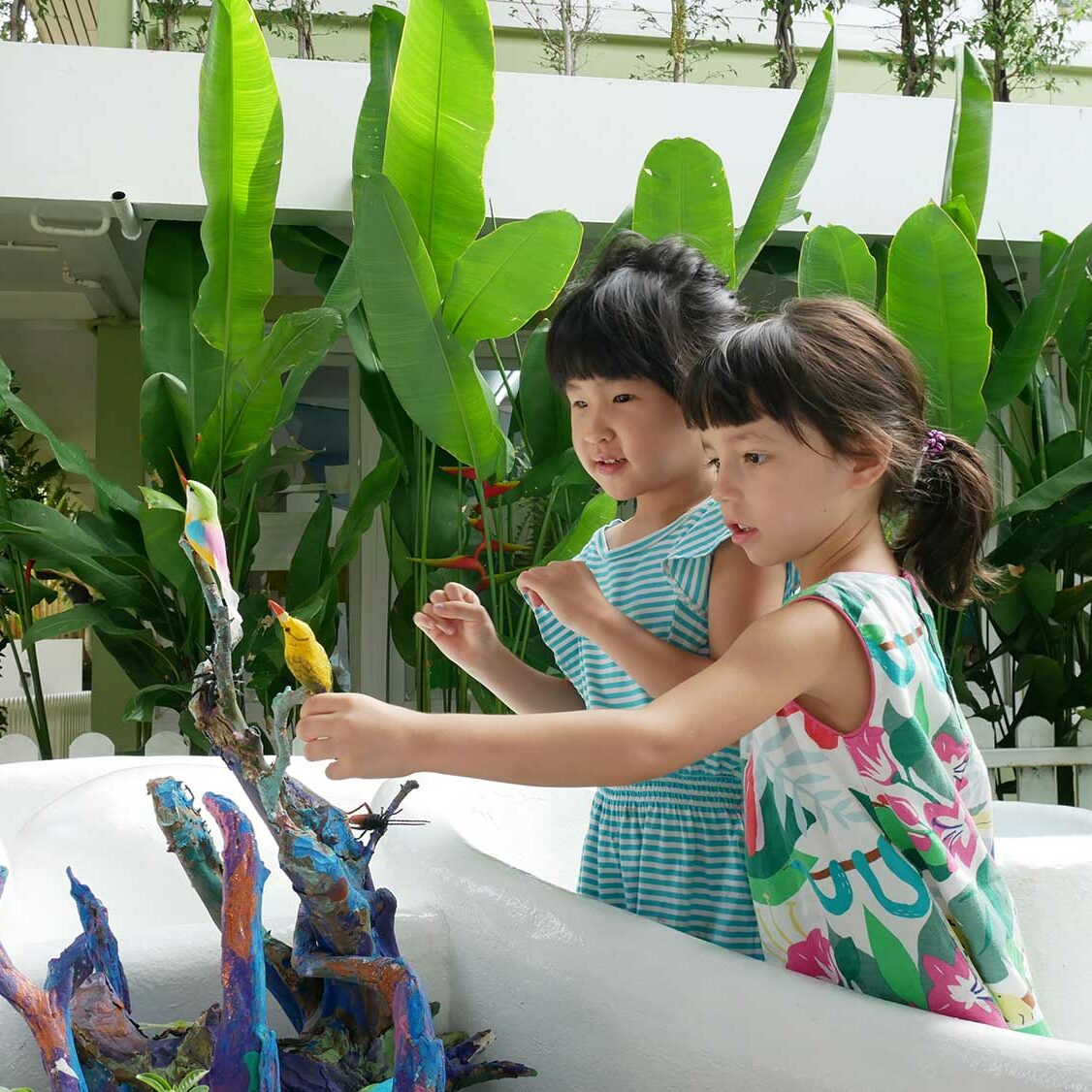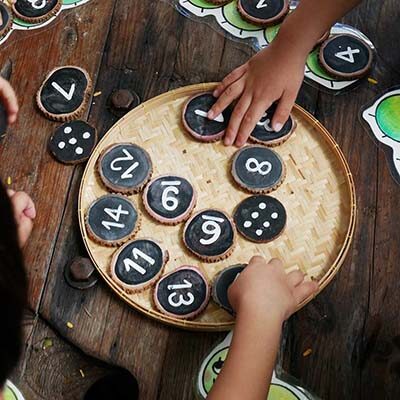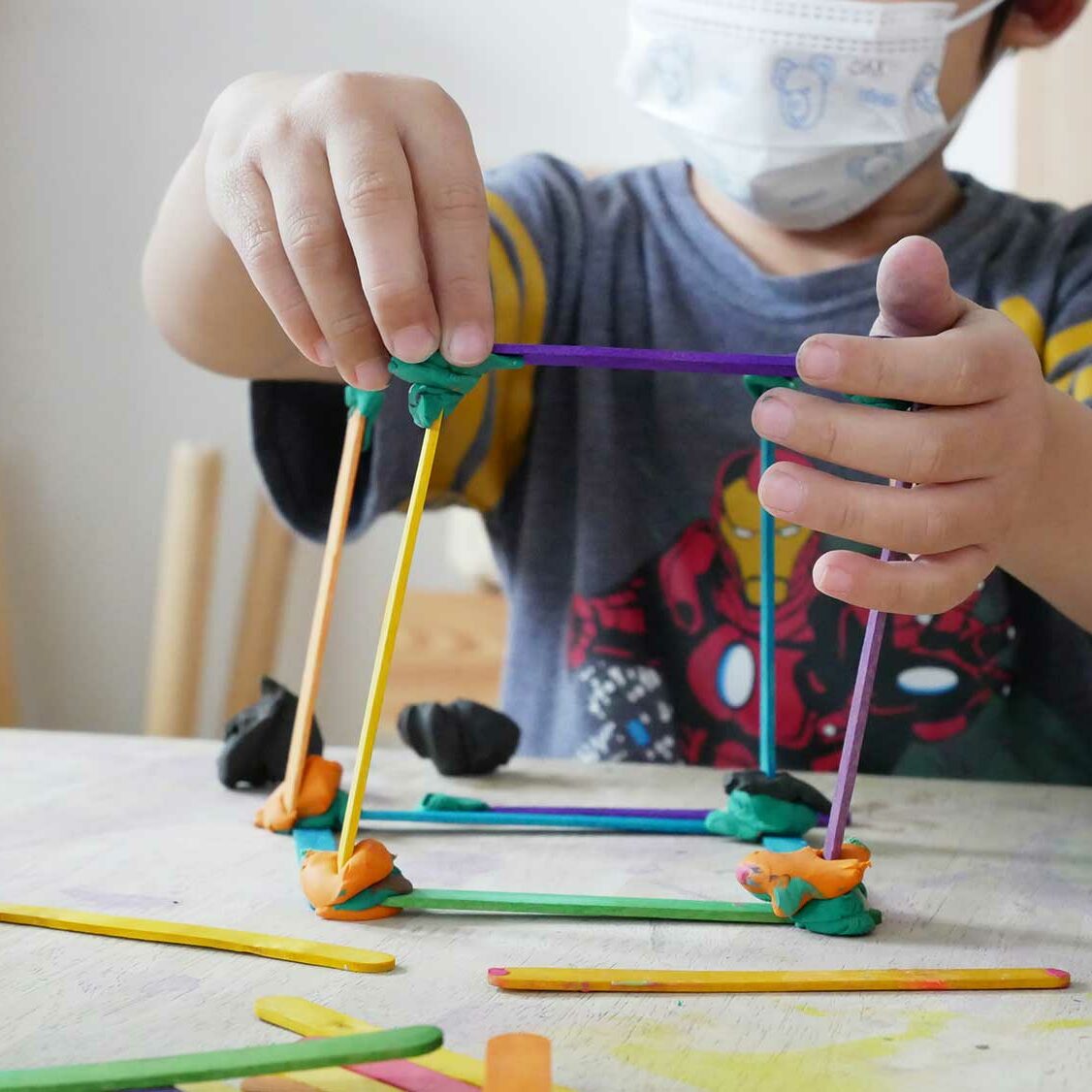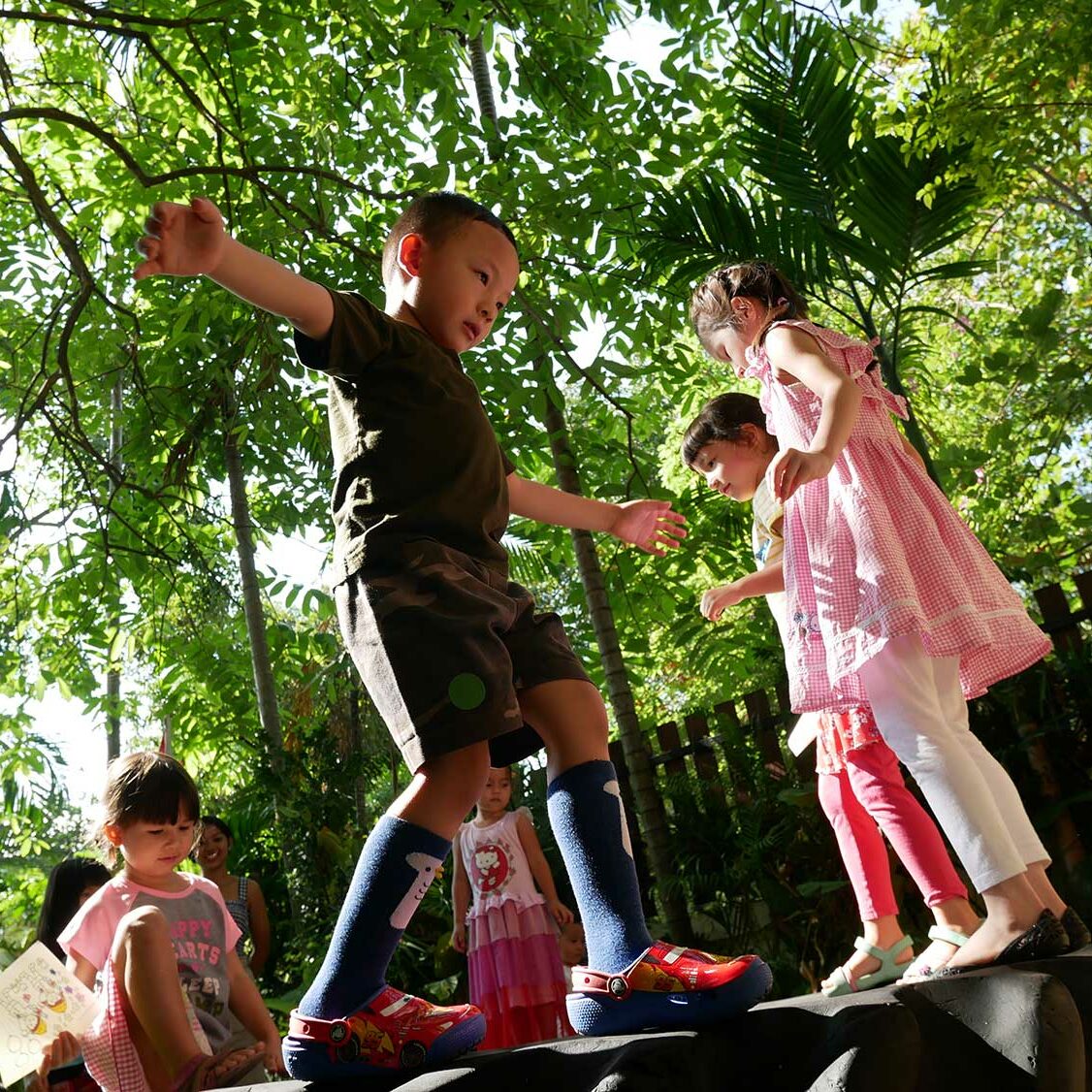The Britsh Foundation Stage Curriculum
The British Early Years Foundation Stage (EYFS) acts as our foundation to guide and support our children through the various developmental areas; our teachers plan games and activities using the following Early Learning Goals (ELG’s). Your child will receive a Development Tracker which offers a complete breakdown of the ELG’s into small, achievable steps that parents are also encouraged to guide and support in the home setting.




There are 6 overriding Developmental Areas under which there are much more specific elements and developmental objectives. These are:
Communication & Language, Personal, Social & Emotional, Physical, Literacy, Mathematics, Expressive Arts & Design

Communication
- Listening
- Understanding
- Speaking

Physical
- Moving / Handling
- Health / Self Care

Literacy
- Reading
- Writing

Mathematics
- Numbers
- Shape, Space & Measures

Knowledge of the World
- People & Communities
- The World
- Technology

Personal, Social, Emotional
- Confidence
- Emotions
- Relationships

Creative Arts & Design
- Exploring Media & Materials
- Being Immaginative
Our Unique Reggio Emilia Approach
Progressive Reggio Emilia Approach
BEYC is one of handful of Reggio Emilia schools in Bangkok. Sticking as closely to the Reggio philosophies as possible our creative teachers do an amazing job of encouraging self-learning and skills practice through the creation of beautiful provocations and imaginative games and activities.
We want our children to choose to practice maths and literacy skills, to enjoy them and show interest and understand the benefits of developing these skills. Any activity presented by the teachers must be exciting, unique, or an interesting sensory experience.
Child-Led Discovery
Our daily Project sessions are a time for the children to develop socially and emotionally as well as intellectually and creatively. Routines of discussion, reviewing and reflecting on project work enable our children to become independent learners and rehearsed in the process of taking an idea from seed to fruition. The children self-reflect on the success and failures of any project. They are guided to make decisions as to whether they wish to revisit, seek support or to move on, in the knowledge that they are in control and in charge of the direction of their personal learning journey.
These higher level independence skills take time to develop and younger children are supported to be independent in age relevant ways.
Ultimately the children become responsible for the research, planning, resourcing of materials and media and finally for the exhibition of completed project work.
Small Group Learning
With 4 skilled teachers in every room of 16 children we are in a privileged position to be able to support each child achieve their own personal targets, in every lesson. Areas of weakness can be observed and recorded with ease, and immediate guidance and support given.
All groups are ability-based for 2 important reasons:
1.To build confidence in less able children who might be more timid and shy in a larger class setting.
2.To appropriately challenge every individual and to make the time with teachers as effective and as meaningful as possible.
Ongoing Informal Assessment
BEYC tracks individuals progress across the 17 Early Learning Goals (ELG’s). Whilst we do not formally test we do keep up to date data on every child. This is achieved through observations, questioning and challenges. Teachers and supports staff record progress and this acts to inform planning and play provocations. Parents are encouraged to regularly meet with their child’s teacher for development updates and to understand the steps we are taking to help them to meet their next goals.
Balance
BEYC follows a progressive Reggio Emilia programme focused on the nurturing of creativity and freedom of expression through child- initiated exploration .
Our curriculum is specifically designed to support our children to excel in every area curriculum development whilst allowing firmly focused on the nurturing of creativity through open-ended play, 100 language philosophy and through creating beautiful provocations to nurture curiosity, inspire creativity and encourage skill development. The curriculum places emphasis on balance. Routine vs spontaneity. Planned vs unplanned. Child- initiated vs adult-guided. Independence vs Support.
Key aspects of our Curriculum

Encouragement to rehearse skills through thoughtful provocations and appropriate challenges Daily and ongoing assessment for all skills to inform planning of provocations

Personalized education plans
 Small class size with high adult support (1:4 ratio)
Small class size with high adult support (1:4 ratio)
 Small ability groups for all adult guided challenges.
Small ability groups for all adult guided challenges.
 100% child-led ‘project work’ (Freedom to choose what, how, and with who)
100% child-led ‘project work’ (Freedom to choose what, how, and with who)
 Loose-part and Open-Ended ‘Nature Play’100% English speaking environment
Loose-part and Open-Ended ‘Nature Play’100% English speaking environment
Looking for Reggio Emilia or Montessori schools in Bangkok?
Questions we are often asked by parents relate to the similarities and differences between Reggio Emilia and Montessori schools in Bangkok. It’s a very legitimate question as they are indeed both very similar in many respects. The truth is we, as do many early childhood settings, share many of the philosophical thinking behind the approaches. The Waldorf, High Scope and Finnish education models are all examples of child-led play to varying degrees and at BEYC we believe in many of the shared values.
We love the Reggio Emilia approach and it is possibly the most evident early childhood approach followed in our setting. As with any single approach however, it does have its limitations. Montessori, High Scope and Waldorf all have their strengths and weaknesses too. For parents looking for Montessori or Finnish schools in Bangkok then we have made a helpful comparison chart.
The Reggio Emilia approach places emphasis on nurturing creative freedom through open-ended play and resources and is perhaps the most child-led approach of all early childhood curriculums. And we love it for that reason. Reggio considers the importance that the environment and all adults in a child’s life have and how they should be included as ‘partners’ at every stage of the learning process.
Montessori shows us the importance of independent and self-paced work and whilst the resources are purpose built and ‘closed’ they do allow children to develop skills . However real-life experience has such a focus that fantasy , fiction and imaginative play are often discouraged completely!
Both Waldorf and High Scope schools place a high degree of emphasis on creativity whilst both championing the importance of real life and hands on experience. Less emphasis is placed on open- ended resources and the importance of nature.
The Finnish and other educational models from Scandinavia teach us much about the importance of nature, lighting, and the warmth created by beautiful interiors. Finnish research in particular shows us how looking after and cherishing teachers and support staff truly impacts on the children in such a positive manner.
Important considerations...
Whether looking for a Reggio Emilia or Montessori schools in Bangkok, parents should be aware of the following:
Curriculum Structure - Whilst traditional education systems act to stunt curiosity and inspiration, simply by the nature of having rigid-curricula, exploration, creativity and healthy risk-taking are all impeded. The obvious consequence of traditional methods are a lack of independence, higher level thinking skills and ultimately a love of learning. Even language development is hindered as a result of being fed information as opposed to seeking it.
Both Reggio and Montessori approaches put the chid first, believing that the desire to learn is present from birth. Everything centers around the child in both curriculars; what they wish to learn and how they desire to go about that learning. From a teacher and parent’s point of view this means that planning, in the traditional sense, ceases to take place. Instead planning is an ongoing, spontaneous process!
Role of Adults - Of the guiding philosophies forming the foundation of Reggio, perhaps the most important for parents and teachers to remember is the important role which teachers, parents have, being partners in education. All have a role to play in inspiring, facilitating and guiding children. A cohesion between all three undoubtedly creates the perfect learning experience. Adults are more included in the learning journey in a Reggio setting. With Montessori children are left alone more often allowing the children to learn by themselves completely. The purpose made resources are evidence of this self-teaching belief. In a Reggio setting, both styles are possible as it truly depends on how a child wishes to play and whether they would like support to to collaborate. The Reggio teacher would make it known to the children that all options are valid and each hav e their respective benefits.
Activity Type - The Montessori method, as with Reggio, places emphasis on nurturing independence. Likewise it views children as naturally eager for knowledge and capable of initiating learning by themselves. Similarly to Reggio classrooms, activities are self-directed, hands-on and collaborative. Montessori resources are ‘closed’ or factory made, with a clear purpose and designed with a single use. Whereas a Reggio class would be equipped with a vast array or ‘open-ended’ resources which children are free to use and ‘interpret’ as they wish. The belief is that through imagination, the child can create anything in their minds’ eye!
Real-Life vs Fantasy - Montessori places a great deal of emphasis on real-life, hands-on activities. So much so, that in strict Montessori kindergartens, imaginative play and fiction are even discouraged! This is perhaps how Montessori differs from Reggio most. Reggio Emila champions fantasy and nurtures imaginative play through freedom, inspiration and open-ended play.
Resources - The Montessori environment are purpose made and specialty materials have a clear intention of use. Parents may be familiar with wooden number puzzles or threading beads, perhaps wooden weaving frames. Essentially the materials aim to develop skills be it maths, phonics, or simply fine motor skills. Without the need for adult support, children are able to practice essential skills, should they choose to play with them. Resources in the Reggio Emilia setting are ‘Open-Ended’ which means that rather than having a purpose they can be used in whatever way a child see fit. This crucial difference opens the doors to imaginative play. You’ve only to ask different children playing with the same loose parts to realise just how diverse imaginative play can get.
Grading and Testing - Neither of the approaches follow testing in the traditional sense. Reggio Emilia does place more importance on frequent and regular observations which act to guide teachers to create play provocations to encourage the development of required skills as well as offer suggestions and inspiration to the direction of ‘projects’.
School Fees Inquiry
Find tuition fee details here.
Let us know your child's information for a personalised response.
